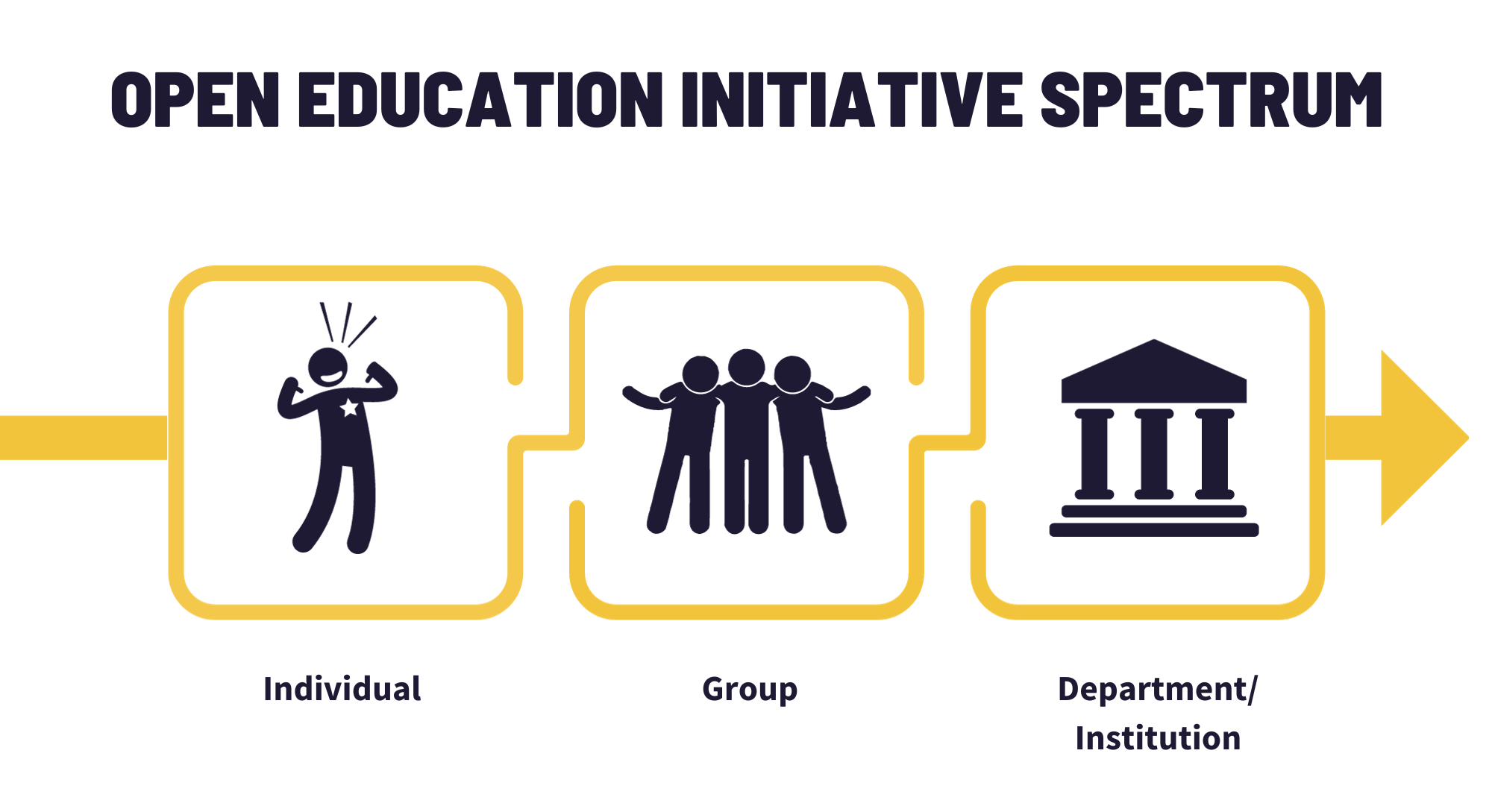Types of Open Institutional Initiatives
Support for open education and OER institutional initiatives can take many forms. Most activities and projects begin at the grass roots level, with individuals or small groups who are passionate about engaging in open projects. Institutional support can help build awareness and encourage adoption and creation efforts across the school.
Below are some types of support initiatives you may encounter in your institution categorized by the number of people involved (beginning with individuals and moving towards departments).
 Individual
Individual
Individuals working within educational institutions can engage in open work either formally as part of their role or informally. Often open work begins informally through the efforts of passionate individuals and then grows into institutionally supported duties or roles. See some examples of the types of roles below.
- Open Education Advocate/Champion is a person who is passionate about open education and serves as a point of contact to support educators in learning more about open education. This person may have developed OER or has knowledge of the process and can share their experiences. The position is usually informal, or in some cases may be formalized as part of their formal role. Examples: University of Guelph OER Champions, Fanshawe College Open Champions, CLOpen: OER with Colleges Libraries Ontario
- OER Librarian is a formal role within the library of an institution. The purpose of this role is to gauge the level of OER use within the institution, provide support in finding OER, and engage in outreach efforts to help build awareness. Examples: Centennial College OER Librarian, Sheridan College OER Librarian, Niagara College OER Librarians
- OER Faculty Developer is a role that usually resides in the institution’s Teaching and Learning center. This role supports faculty in engaging with open education through training and project opportunities. Example: Loyalist College – Open Education Strategist
 Institutional Group
Institutional Group
OER Committees, Working Groups, and Communities of Practice are either informal or formal groups established within an institution to support faculty who are interested in open and to help build awareness. Working groups may be tasked with objectives, such as building an open policy for the institution, developing recommendations and guidelines for the institution.
Examples:
- McMaster’s OER Committee began as a grassroots collaboration focused on advocating for awareness and use of OER with an aim to make course materials more accessible and affordable for students. Two key projects of this committee were incentivizing development of OER by establishing an OER Grant Program and lowering the barrier to faculty adoption of OER by publishing the McMaster OER By Discipline Guide.
- Seneca Open Educational Resources (OER) Sub-Committee
 Department
Department
An OER Development Department involves a full-scale wrap-around support structure for faculty to develop OER and engage in Open Pedagogy. Department structures can come in many forms but include key individuals who are passionate about open. Individuals can include staff, faculty and students working in different ways. It may include part-time, full-time and temporary contract work.
Examples:
- Fanshawe OER Design Studio The Fanshawe OER Design Studio provides support to faculty and staff looking to adopt or create open educational resources (OERs) to be used by students in Fanshawe courses and programs.
- Ontario Tech University – Open Education Lab is a student-run, staff-managed group that brings content and technological expertise to the timely creation of high quality OER that will be used directly in an Ontario Tech course by Ontario Tech students.
- Centennial College OER LAB The OER Lab is a student-run, staff-managed service, providing support in OER development and adaptation to the Centennial College community.
Institutions
Institution-wide support for open education may rest with a particular department or be interwoven through the school. Institution support at this level includes strategic goals and the development of policy. Policies help shape strategic planning, tenure and promotion, faculty development programs, grants, textbook costs, and institutional culture more broadly (Skidmore & Provida, 2019).
Cross-Institutional Initiatives
There are a number of groups that Ontario postsecondary faculty, staff and administrators are involved with to help expand open work in the province.
- eCampus Ontario OER Rangers are a network of educators advancing the open movement at higher education institutions across Ontario. Using open practices, rangers lead others to develop OER and make education more affordable, accessible, and effective.
- eCampus Ontario – Ontario Open Library Network (OOLN) is a space for librarians, faculty, students, instructional designers, and educational technologists interested in Open Education to exchange ideas. Get started by joining the Slack channel.
- Canadian Association of Research Libraries (CARL) Open Education Working Group is a group of Canadian librarians working in and committed to open education (OE). The group is designed to offer experienced insight towards ensuring ongoing relevance of CARL’s open education activities, and towards creating high-quality opportunities for librarians to develop capacity and leadership skills in open education. Its activities and programs are designed to bolster this emerging area of practice and support the development of national leadership in this arena. In 2023 the Open Education Working Group (OEWG) moved into the newly formed Advancing Teaching and Learning Committee (ATLC) at CARL.
- College Libraries Ontario Communities of Practice brings together information about OER initiatives at Ontario Colleges.


